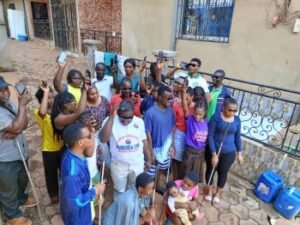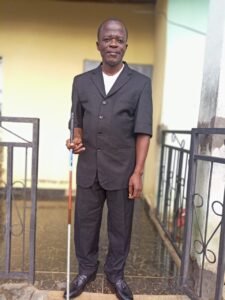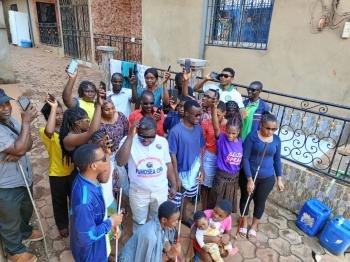Whatever reasons are put forth for imposing the lockdowns, thousands of disabled persons are paying a huge price.

By Princely Kesah, Cameroon
Dire humanitarian assistance is urgently needed to restore hope among persons with disabilities in Anglophone Cameroon. If they are not escaping flying bullets, many are trapped in despair under a lockdown imposed by separatist fighters in the Northwest and Southwest regions — areas torn apart by an armed conflict now approaching its tenth year.
The latest lockdown, declared by separatists fighting for an independent state called Ambazonia, has left thousands of persons with disabilities in a desperate situation. Leaders of Persons with Disabilities (PWDs) are appealing to the international community for urgent humanitarian aid.
“We will not only die from bullets; we will die from starvation,”
— said Samuel Nyuingcho, a leading disability rights advocate in Anglophone Cameroon.

Nyuingcho, who is visually impaired, told Disability News Africa (DNA) that the lockdown has crippled movement, closed businesses, and isolated entire communities. Disabled persons, he said, are “at a crossroads,” as access to food, healthcare, and basic services has become a distant dream for over fifty thousand PWDs across the two Anglophone regions.
In 2025 alone, lockdowns have been imposed several times. The current one began on September 8 and, at the time of writing, was still ongoing — expected to end around October 14. Separatist leaders say the lockdowns, first introduced in January 2017, are intended to cripple what they call the “Francophone-dominated government” economically.
Local sources, however, say the latest lockdown is also meant to stop the government — which separatists describe as a “colonial regime” — from organizing the upcoming presidential election scheduled for October 12 in the Anglophone regions. Whatever the reasons, thousands of disabled persons are paying the highest price.
Felix Neba, a blind street bread seller in Bamenda, capital of the Northwest Region, says he now goes to bed unsure of getting even one meal the next day.
“I only eat from what I make as profit from my sales,” he told DNA, his voice trembling. “I’ve been home for weeks. The little capital I had is finished, and I have nothing left to eat.”
Neba says even after the lockdown is lifted, he will have no money to restart his business. His case reflects the daily struggle of thousands of PWDs — many of whom were family breadwinners before the conflict but have now been reduced to beggars.
As gunfire continues to echo across the regions, many people have fled their homes. But those with disabilities, unable to run or find transport, are left behind — at the mercy of hunger, stray bullets, and even wild animals. This happens mostly in rural areas where accessibility is already poor. Dozens have reportedly died from neglect, while many more remain in desperate need of food, medical care, and support to rebuild their lives.
It is on this basis that leaders like Samuel Nyuingcho and Felix Neba are calling for immediate international intervention.
“We urge the international community, especially the United Nations, to step in and provide emergency relief to persons with disabilities in the Northwest and Southwest regions of Cameroon,”
— read part of a statement from Nyuingcho.
